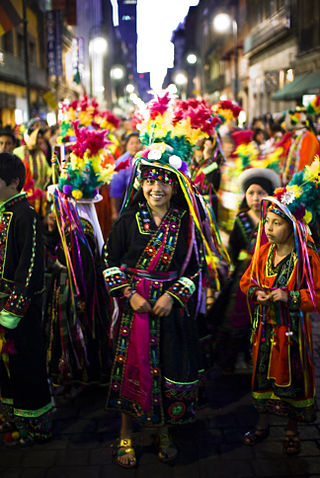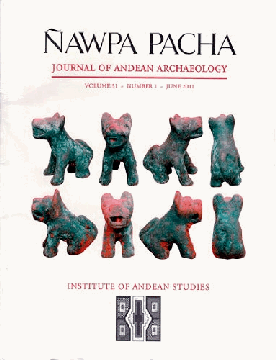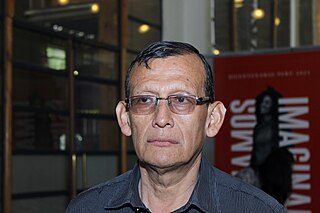
Quechua, usually called Runasimi in Quechuan languages, is an indigenous language family spoken by the Quechua peoples, primarily living in the Peruvian Andes. Derived from a common ancestral language, it is the most widely spoken pre-Columbian language family of the Americas, with an estimated 8–10 million speakers as of 2004. Approximately 25% of Peruvians speak a Quechuan language.

Quechua people or Quichua people, may refer to any of the aboriginal people of South America who speak the Quechua languages, which originated among the Indigenous people of Peru. Although most Quechua speakers are native to Peru, there are some significant populations in Ecuador, Bolivia, Chile, Colombia, and Argentina.

Hilaria Supa Huamán is a Peruvian politician, human rights activist, and an active member of several Indigenous women's organizations in Peru and around the world. She was a Congresswoman representing Cusco from 2006-2011, as a member of Ollanta Humala's Partido Nacionalista Peruano party.
Cuzco Quechua is a dialect of Southern Quechua spoken in Cuzco and the Cuzco Region of Peru.

Santiago del Estero Quichua or Santiagueño Quechua is a vulnerable dialect of Southern Quechua spoken by 60,000-100,000 people in Argentina. It is spoken in the province of Santiago del Estero. The estimated coordinates are 27°47′S 64°16′W. Long-standing migration has also resulted in the presence of the language in other provinces of northeastern Argentina and in Buenos Aires.

Spanish is the de facto official and administrative language of Chile. Spoken by 99.3% of the population in the form of Chilean Spanish, as well as Andean Spanish and Chilean Catalan, Spanish in Chile also receives the title of "castellano." Although an officially recognized Hispanic language does not exist at the governmental level, the Constitution itself- as well as all official documents- is written in this language.

The Indigenous peoples of Peru, or Native Peruvians, comprise a large number of ethnic groups who inhabit territory in present-day Peru. Indigenous cultures developed here for thousands of years before the arrival of the Spanish in 1532.
Willem F. H. Adelaar is a Dutch linguist specializing in Native American languages, specially those of the Andes. He is Professor of indigenous American Linguistics and Cultures at Leiden University.

Pachamama is a goddess revered by the indigenous peoples of the Andes. In Inca mythology she is an "Earth Mother" type goddess, and a fertility goddess who presides over planting and harvesting, embodies the mountains, and causes earthquakes. She is also an ever-present and independent deity who has her own creative power to sustain life on this earth. Her shrines are hallowed rocks, or the boles of legendary trees, and her artists envision her as an adult female bearing harvests of potatoes or coca leaves. The four cosmological Quechua principles – Water, Earth, Sun, and Moon – claim Pachamama as their prime origin. Priests sacrifice offerings of llamas, cuy, children and elaborate, miniature, burned garments to her. Pachamama is the mother of Inti the sun god, and Mama Killa the moon goddess. Mama Killa is said to be the wife of Inti.

Andean Spanish is a dialect of Spanish spoken in the central Andes, from southern Colombia, with influence as far south as northern Chile and Northwestern Argentina, passing through Ecuador, Peru, and Bolivia. While similar to other Spanish dialects, Andean Spanish shows influence from Quechua, Aymara, and other indigenous languages, due to prolonged and intense language contact. This influence is especially strong in rural areas.

Bolivians are people identified with the country of Bolivia. This connection may be residential, legal, historical or cultural. For most Bolivians, several of these connections exist and are collectively the source of their being Bolivian.
Cajamarca Quechua is a variety of Quechua spoken in the districts of Chetilla, Baños del Inca and Cajamarca (Porcón) in the Peruvian province of Cajamarca, along the northwest coast of Peru.

Yanantin is one of the defining characteristics of native Andean thought and exemplifies Andean adherence to a philosophical model based in what is often referred to as a "dualism of complementary terms" or, simply, a “complementary dualism". Much like in Chinese Taoism, Andean philosophy views the opposites of existence as interdependent and essential parts of a harmonious whole. Because existence itself is believed to be dependent upon the tension and balanced interchange between the polarities, there is a very definite ideological and practical commitment within indigenous Andean life to bringing the seemingly conflicting opposites into harmony with one another without destroying or altering either one. Among the indigenous people of Peru and Bolivia, the union of opposing yet interdependent energies is called yanantin or "complementary opposites."

Ñawpa Pacha, Journal of Andean Archaeology is a biannual peer-reviewed academic journal published by Taylor & Francis on behalf of the Institute of Andean Studies. Ñawpa Pacha means "Antiquity" in the Quechua language. It was established by John Howland Rowe in 1963.
Kichwa Hatari is the first Kichwa-language radio station in the United States, broadcasting in a variation of the Quechua language spoken by indigenous Ecuadorean Kichwas.

Pablo Landeo Muñoz is a Peruvian award-winning writer, translator, and teacher of language and literature. His literary works are written in Quechua and Spanish.
Elva Ambía is a Peruvian award-winning educator, Quechua language activist, writer, and founder of the Quechua Collective of New York.
Clodoaldo Soto Ruiz is a Peruvian scholar, author and former Quechua professor at the University of Illinois at Urbana–Champaign.
Luis Morató is a Bolivian scholar, author and former Quechua professor at Cornell University.
Américo Mendoza Mori is a Peruvian scholar. He has contributed to the fields of Latin American Studies, Latino/a Studies, and Quechua languages. He teaches at Harvard University.











